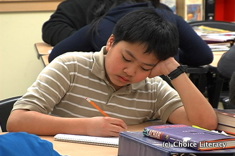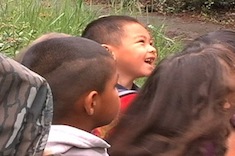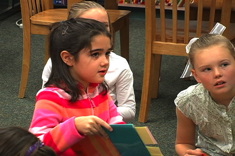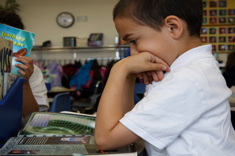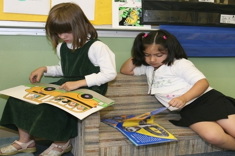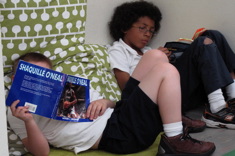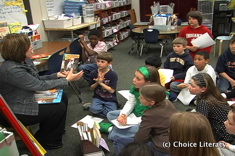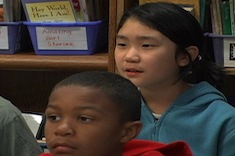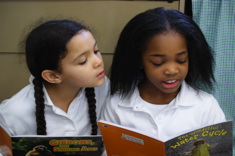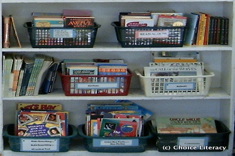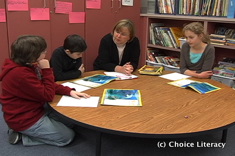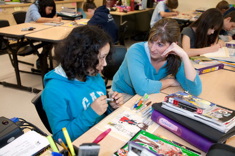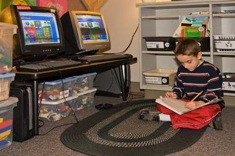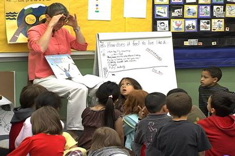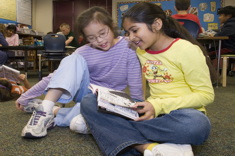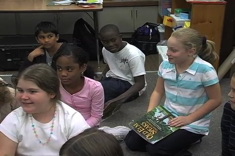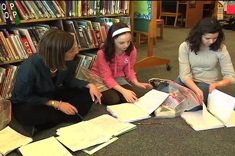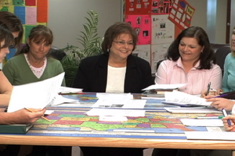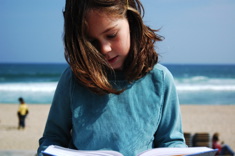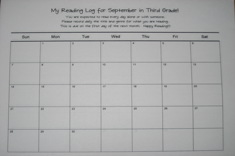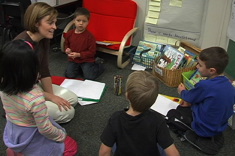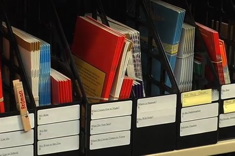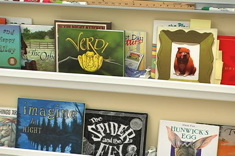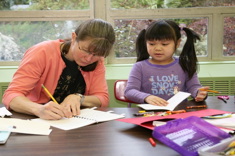Teaching Reading
Our contributors lead reading workshops in classrooms with creative flair. Over the past 12 years, we've filled our site with loads of suggestions, tools, and tips for using engaging books throughout the curriculum to hook kids on reading. Here is where you will find many stories of successful and not-so-successful workshop days, and what we learned from them. We bring these stories to life through hundreds of video examples.
Latest Content
Dear Mrs. T: Moving Students from Summaries to Rich Response
Karen Terlecky shares how student letter writing about books has evolved over the years. The secret? Karen uses student letters from previous years as mentor texts for moving her 5th graders from summaries to more sophisticated responses.
Making a Difference: Examples from Children’s Literature (BOOKLIST)
Spring is a time in many schools for volunteer work and community service projects. This booklist will inspire your students.
Challenging Advanced Young Readers: Harder Texts Aren’t Always the Answer
Clare Landrigan and Tammy Mulligan discuss the concept of “challenge” in considering what texts are the best fit for advanced young readers who might be able to decode any text but don’t yet have the experiences needed to tackle sophisticated concepts.
From Page to Screen: My Top Ten Film Adaptations of Children’s Books
Shari Frost is inspired to create a list of her favorite children’s book to film adaptations.
Great Nonfiction for Elementary Students
As the quality of nonfiction for students has grown, so have our expectations for using these books with students. Franki Sibberson's presents texts that can help students move beyond "skimming and scanning," and into more in-depth reading.
Choosing New Books for Comprehension Strategy Studies with Young Children
Ruth Shagoury and Andie Cunningham share a wealth of books appropriate for comprehension study with young children. The booklist is especially useful for work with English language learners.
Biographies Off the Beaten Path
Here are some quirky biographies that will inspire and delight your students.
Using Summer Reading to Expand the Whole School Reading Community
What big messages do we give to students with summer reading assignments? Franki Sibberson considers this question and shares the template she sends home with children of all ages.
Books That Invite Conversations About Perspective (BOOKLIST)
Students need to understand perspective (or point of view) if they want to comprehend what motivates a character. In this booklist, Franki Sibberson highlights some terrific children's literature for helping students grasp the concept of perspective.
Character Study in Grades 3-6
A character study unit is a terrific choice early in the school year, since it taps into students' reading histories and favorites from years past. Franki Sibberson has suggestions of books and questions for use in read-alouds.
Mentor Texts for Urban Students
What texts work best for students with urban backgrounds? Shari Frost has suggestions for teachers.
How Do We Talk with Parents About What It Means to Be Challenged in Reading?
Discussions with parents of precocious young readers can be tricky. Clare Landrigan and Tammy Mulligan have some tips for these conferences.
Out of the Closet and into the Classroom: Bookroom Management Tips for Literacy Coaches
Is your system for sharing books from a school bookroom or literacy closet working well? Shari Frost provides 10 practical tips for getting the best use out of shared literacy resources.
Planning to Teach with Mentor Texts: Two Examples
Once you’ve found a text you love, how do you plan lessons from it? Karen Terlecky takes teachers through the process of selecting and designing instruction with two favorite texts.
The Book Lovers Quilt Project
Katie Doherty and Ruth Shagoury present a fun way to launch (or close) the year with middle schoolers and discover the best-loved books of students from previous years. This project can be adapted for any age level.
The Reading Skills We Use When Searching the Internet
Browsing and previewing skills change when the medium is the Internet. Franki Sibberson has advice for working with tech-savvy young readers.
Books for Strategy Studies
Andie Cunningham has some thoughtful recommendations for books to use in strategy studies.
Fairy Tales for Middle Grade Readers (BOOKLIST)
This booklist is on fairytales, and there are a range of reading levels and styles to support readers of different ability levels.
Using Poetry to Promote Reading Fluency
Aimee Buckner shares how to use a mentor text to build fluency through poetry.
Making Book Logs Purposeful for Students
Is the use of reading logs getting a little stale in your classroom? Clare Landrigan and Tammy Mulligan have suggestions for assessing and refreshing the activity.
Aligning Curriculum with Struggling Readers in Mind
This is a terrific article for a team considering struggling learners to read together and discuss. Franki Sibberson asks some critical questions, including how many transitions and different adults some children work with each day in the name of getting all the support they need.
Hallmarks of Reading Workshop
Karen Szymusiak works with her staff to develop "Hallmarks of Reading Workshop," which is a succinct and concrete list of expectations for time, components, and organization of workshops. The list would be an excellent jumping off point for discussion in a staff meeting of bottom-line standards and allocation of time for literacy activities.
The Luxury of Extra Reading Time Over the Holidays
Franki Sibberson finds the days before holiday break are the perfect time for talking through with students how to make pleasure reading choices. Her feature includes a template to help students organize and think through their preferences.
Rethinking Reading at Home
What’s the value of reading at home? Mandy Robek ponders the home/school connection. Download a copy of a rubric to assess the home reading log.
Overcoming Tears and Fears: Developing Criteria for Flexible Groups
Katie DiCesare comforts a student in tears at the end of the day, and realizes part of the problem may be that she moved the child into a guided writing group too quickly.
Why and Watch Me: Making the Abstract Concrete for Readers
Clare Landrigan and Tammy Mulligan present some teacher question and reflection prompts for helping struggling readers understand why and how reading is a meaning-making process.
Letters in the Middle School Classroom
First-year teacher Erin Ocon finds an old-fashioned way to build rapport with some of her struggling middle school students – she writes letters to them. This brief article would be a good reading for a middle school team meeting or new teacher group.
Books for Phonics Instruction – Accomplishing More Than Just Sounding Out Words
Shari Frost finds herself appalled at some of the "books" children are reading in the name of phonics instruction, so she sets out to create a booklist of high quality children's literature that does more than just help children sound out words.
Letting Students Define and Design My 6th Grade Classroom Library
Katie Doherty's 6th graders take charge of the classroom library, with an activity designed to build an understanding of genre at the same time.
Selecting Texts for Strategy Teaching with English Language Learners in Mind
Text selection for English language learners poses special challenges. Clare Landrigan and Tammy Mulligan explain how the criteria for “just-right books” are different for ELLs, and provide practical examples of how teachers use these principles of book selection in their classrooms.
Browse Content By
Type
Category
- Assessment Tools
- Big Fresh Archives
- Booklists
- Choice Numeracy
- Classroom Design
- Common Core
- Community Building
- Conferring
- Content Literacy
- Digital Literacy
- English Language Learners
- Equity
- Family Relations
- Free Samples
- Guiding Groups
- Leadership
- Literacy Coaches
- Mentor Texts
- Minilessons
- New Teacher Mentors
- Podcasts
- Poetry
- Quote Collections
- Reading Strategies
- Self Care
- Struggling and Striving Learners
- Talking and Listening
- Teacher Study Groups
- Teaching Reading
- Teaching Writing
- Word Study and Vocabulary
Author
- Melissa Quimby
- Nawal Qarooni
- Gwen Blumberg
- Julie Cox
- The Lead Learners
- Hannah Tills
- Josie Stewart
- Ruth Metcalfe
- Mallory Messenger
- Becca Burk
- Jodie Bailey
- Vivian Chen
- Mary Brower
- Tiffany Abbott Fuller
- Stephanie Affinito
- Ruth Ayres
- Leigh Anne Eck
- Heather Fisher
- Shari Frost
- Julie Johnson
- Suzy Kaback
- Gigi McAllister
- Shirl McPhillips
- Melanie Meehan
- Cathy Mere
- Debbie Miller
- Tara Barnett and Kate Mills
- Tammy Mulligan
- Dana Murphy
- Bitsy Parks
- David Pittman
- Brenda Power
- Heather Rader
- Matt Renwick
- Mandy Robek
- Christy Rush-Levine
- Gretchen Schroeder
- Jen Schwanke
- Brian Sepe
- Katherine Sokolowski
- Stella Villalba
- Jennifer Vincent
Grade Level
Choice Literacy Membership
Articles
Get full access to all Choice Literacy article content
Videos
Get full access to all Choice Literacy video content
Courses
Access Choice Literacy course curriculum and training

